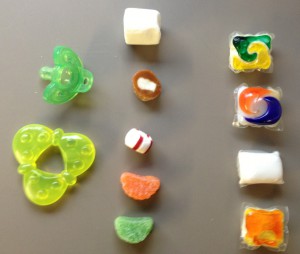It happens all the time: A parent is doing laundry and has the detergent sitting on the floor while her toddler plays nearby.
Poisoned?
Call 1.800.222.1222 to reach the Blue Ridge Poison Center 24/7 immediately if you suspect your child has ingested a laundry pod or any other toxic substance.
Then the parent leaves the room to grab some more laundry. The curious toddler eyes the open bottle of laundry detergent and takes a quick lick.
Parents call UVA’s Blue Ridge Poison Center about this almost daily, but the situation usually isn’t serious. The child might gag or have a mild upset stomach or eye irritation, according to Scott Wiley, an RN and certified specialist in poison information at the Poison Center’s call center. But now there’s a newer product that is serious: the colorful laundry pods or dishwashing detergent pods that look like toys or candy.
The pods are about one square inch in size and feel squishy. They can have powder or concentrated liquid inside them, but it’s the concentrated liquid ones that cause severe illness in kids.
Laundry Pods: More Toxic, More Tempting
They may look a lot like candy. But if kids consume them, the effects are worse than traditional liquid or powder detergents.

“By and large, traditional laundry detergent is not that toxic, especially when you’ve only gotten a small taste,” says Kristin Wenger, education coordinator for the Blue Ridge Poison Center. “There’s something about these concentrated packets that’s different. … Kids are getting much sicker.”
Symptoms may include:
- Excessive vomiting
- Wheezing and gasping
- Extreme lethargy (sleepiness)
- Severe eye or throat irritation
Around the country, a few kids became so lethargic that they were having trouble breathing and needed a mechanical ventilator, Wenger says. “There have been a lot of hospitalizations. You don’t usually see those from traditional detergent.”
The Blue Ridge Poison Center handles poison-related calls in the Charlottesville area, Southwest Virginia, the Shenandoah Valley, and parts of Southside Virginia. Since September, at least 28 parents in this region have called the poison center after their kids were exposed to the concentrated liquid detergent pods.
In the U.S., 4,595 kids ages, 5 and under were exposed to these pods during a nine-month period this year, according to the American Association of Poison Control Centers.
Wiley has a couple of thoughts about why these pods make kids so sick:
- The small size and shapes mean kids can get more detergent in their mouths and down their throats quickly.
- There’s an additional drowsiness-inducing ingredient that’s not in traditional detergents.
Prevent Laundry Detergent Poisonings
Keep laundry detergent out of sight and reach, Wenger suggests, and don’t leave kids unattended with it.
“Only take out as much as you need, close the door to the machine and make sure it starts,” she says. “Don’t put it in the machine and then set the timer and walk away, because a little kid might be able to figure out how to open the compartment and retrieve it when Mom or Dad isn’t looking.”
And if it’s in a child-resistant container? Play it safe anyway. Kids can figure those out. Store these products up high, out of a child’s reach and sight.
If you think your children have consumed laundry detergent or rubbed it in their eyes, call 1.800.222.1222 right away, even if there are no symptoms. This toll-free number works anywhere in the country. If possible, bring the container to the phone with you, Wenger says.
The advice is free and may help you avoid a trip to the emergency room.
“We have trained professionals who can assess the scenario and figure out what to do for your particular situation,” Wenger says. “It’s not the kind of advice you find on the internet.”
How Can You Prevent Poisoning?
Parents, teachers, and health care providers: Get safety tips and free poison prevention materials through the Blue Ridge Poison Center.
